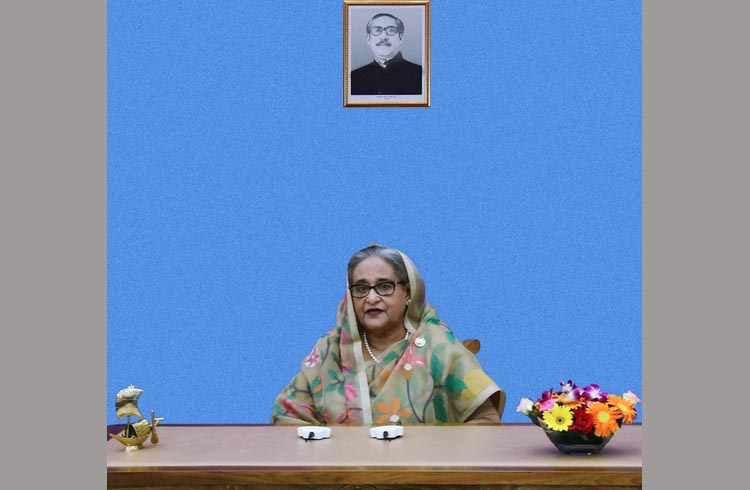
DHAKA, May 22,2022 (BSS) - Prime Minister Sheikh Hasina today urged the global community to work towards concluding the 'Pandemic Treaty' for an inclusive and equitable response to future pandemics.
"We must work towards concluding the Pandemic Treaty for an inclusive and equitable response to future pandemics," she said in a video statement broadcast
at the High-level Segment in the Seventy-fifth World Health Assembly.
The assembly is being held in Geneva, Switzerland, on 22-28 May 2022. It is the first in-person Health Assembly since the start of the COVID-19 pandemic.
Sheikh Hasina said they cannot ensure a sustainable recovery by leaving millions behind in the vaccination efforts.
In this connection, she said, "Technology and technical know-how need to be shared to scale up vaccine production in developing countries like Bangladesh."
The Prime Minister said that the COVID-19 pandemic is still having huge impacts on lives and livelihoods around the world.
In Bangladesh, she said, her government has managed to tackle its threats through a combination of healthcare, fiscal and social safety measures.
"We announced 28 stimulus packages worth 23 billion US dollars, which is about 6.3% of our GDP. We provided cash and other assistance to nearly 40 million vulnerable people. We provided vaccines to our people free of cost," she said.
The premier reiterated that they managed to contain the pandemic in the most densely populated camps for Myanmar's forcibly displaced Rohingyas.
"My government allocated 1.61 billion US dollars for procuring vaccines from our national budget," she stated.
The Prime Minister thanked Bangladesh's development partners for their donation of COVID-19 vaccines, including through COVAX and said over 100% of the target population has already been vaccinated.
"We are grateful for the dedicated work of our frontline service providers," she said.
Bangladesh tried to stand by its neighboring countries with medicines, PPEs and healthcare workers, she said, adding, "We believe that vaccines should be treated as global public goods."
The Prime Minister said the world community must give added attention to climate change impacts on disease burden.
Bangladesh stands ready to collaborate on medical research, including for neglected tropical diseases, she said, adding that anti-microbial resistance needs to be addressed in a concerted manner.
"We must remain focused on non-communicable diseases expanding in developing countries," she opined.
The premier reiterated that all need to invest further in research and access for cancer and diabetes treatments.
She mentioned that the mental health issues deserve to be addressed as part of health emergency response.
"We seek international support in preventing road accidents, drowning and other public health hazards," she added.
The Prime Minister thanked the government of India and WHO for taking lead on traditional medicine research and standards.
She said Bangladesh remains committed to achieving SDG-3 to promote healthy living for people of all ages.
"We have been able to take health care services to the doorsteps of our people through more than 18,000 community clinics and health centers," she stated.
The premier said her government is actively working on child nutrition, with marked decline in stunting and wasting between 2007 and 2019.
"We aim to have 65% birth deliveries by skilled attendants and 50% coverage of four antenatal-care visits by the end of 2022," she continued.
Noting that the WHO remains the most important actor in global health governance, she said, "We must provide sustainable financing and allow necessary reforms to enable WHO to support health systems around the world."
Bangladesh commits to do its part in line with its priorities for public health and diplomacy, she added.
French President Emmanuel Macron, Presidents of Kenya, Dominican Republic, Botswana, Croatia, Vice President of Ecuador and UN Secretary General also delivered speeches.